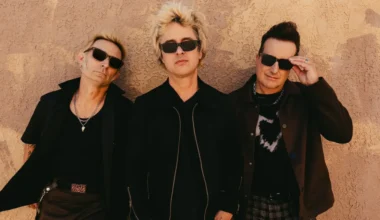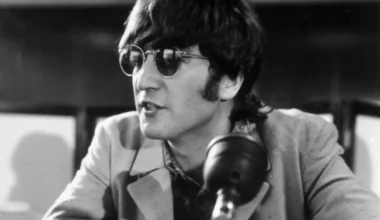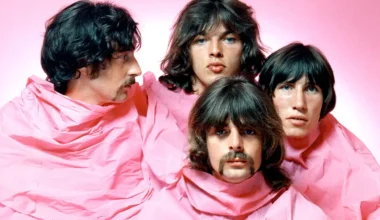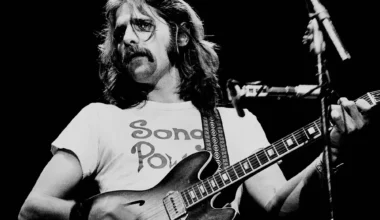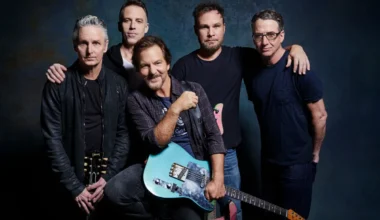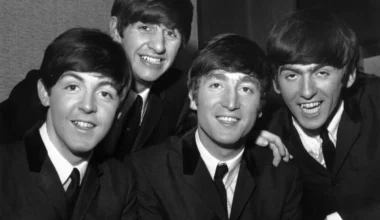“I just got so fed up with the bad vibes. I didn’t care if it was The Beatles; I was getting out.” – George Harrison
At least initially, George Harrison had a straightforward job in The Beatles. He was the distinctive and fashionable guitarist who supported John Lennon and Paul McCartney as the group’s primary songwriters. He was always prepared to harmonize and provide mind-bending guitar riffs. By 1969, things shifted, and Harrison tired of always being the supporting actor to the dominant pair.
He’d tasted his success, felt inspired by Bob Dylan, and the prospect of a future unencumbered by brilliant bandmates beckoned.
By the time Abbey Road and Let It Be were approaching, Harrison had already established his musical abilities with songs like “Taxman” and “Within You Without You.” Following a few periods of success on previous albums, he was now eager to apply his songwriting talent more consistently. He aimed to do so on the Fab Four’s releases. Lennon and McCartney were not happy about the decision when they learned about it.
Harrison momentarily left the band as a result of the conversations—or, perhaps more importantly, the lack of them. He felt disregarded when performing some of his compositions. The eerie quiet performances that included “All Things Must Pass” contribute to the guitarist’s understandable rage. Harrison brashly left the Get Back meetings.
The record featured a similar lineup to the band’s earlier records: Paul McCartney and John Lennon were in charge. They made this record intentionally to break away from the constraints of exact studio work. The aim was to once again experience the emotion of performance. George Harrison found the sessions intolerable, as seen in the fly-on-the-wall documentary directed by Peter Jackson.
Right in the middle of Twickenham’s Let It Be sessions, on January 10, 1969, the guitarist finally left The Beatles due to internal strife and a power struggle. Harrison completed the task without much fanfare on the outside. But Harrison’s internalized irritation was starting to take control of his life. He would write one of the greatest songs in his vast discography, proving his critics wrong even though he had left the studio in a rut.
By the beginning of 1969, George Harrison had started to develop his musical style. Harrison had hope for the future of the Fab Four after spending a large portion of the previous year working on songs like “I’d Have You Anytime” with Bob Dylan and The Band. He received much praise for his contributions to The Beatles. He wanted more as part of a well-oiled system. Prior albums featured a selection of his songs, which received a favorable reception.
The band had been fighting for a while during this time. On Sgt. Pepper, McCartney’s control over the Beatles reached an all-time high. His controlling demeanor had already forced Ringo Starr to resign. This sent the drummer to Italy with a lot of unresolved fears hanging over him. In the meantime, Lennon was becoming more and more dependent on heroin, and Yoko Ono, his personal and artistic partner, was supporting him. However, her presence at the studio was a source of controversy in and of itself. Harrison was nevertheless upbeat: “I remember feeling pretty optimistic.” “Well, it’s the New Year, and we have a new approach to recording,” I reasoned.
They named the new strategy Get Back, a multimedia project that planned to videotape rehearsals for a live performance of brand-new material prepared for a television special. The band would get back to their roots and rediscover their sound in a more unadulterated manner. But things didn’t go as planned, and Macca assumed the conductor’s job very soon. Harrison told Guitar World in 2001 that “then, Paul couldn’t see beyond himself.” He was having a great time, yet everything around him seemed to be there only to support him. He didn’t care to tread on the sentiments or egos of others.
Harrison started to propose new songs like “Let It Down” and “Isn’t It A Pity.” He even introduced the well-known “Something“—songs that would later come to characterize the band’s or his output. But Lennon and McCartney persisted in dismissing the guitarist in favor of their songs. They didn’t even bother to hear Harrison perform a demo of the new songs. A new evaluation of the recording process by Peter Jackson shows these heartbreaking moments in real-time. They throw twelve of his greatest works into the fire.
It is easier to appreciate his frustrations when you take into account the quality of the songs that are being debated. Examples include “Not Guilty,” “Run of the Mill,” “Isn’t It A Pity,” and “Sour Milk Sea.” Tensions were already high when, during a recording session, Harrison became impatient with Macca. The latter tried to teach him how to play his guitar. Harrison declares, “I’ll play whatever you want me to play, or I won’t play at all,” with a look that belies his threat. “I’ll do whatever will make you happy.” Two days later, the door to the escape was cracked open and the strain would grow.
Harrison made his debut with another classic, “I, Me, Mine,” on January 8th, but once again, he was received with apathy. This is where things started to get a little heated. Harrison became enraged after hearing Lennon’s mocking remark, so he lashed out at Yoko Ono. Lennon recalled him saying, “Dylan and a few people said she’s got a lousy name in New York.” “It” lit the touch paper, igniting a ten-year bond that had held the gang together.
The camel’s back was ultimately broken when Harrison went to his bandmates and recommended they post a notice for his successor. He added that he would “see you round the clubs” after supposedly coming to blows with Lennon in the days that followed. Harrison later acknowledged, telling Musician magazine in 1987, “I just got so fed up with the bad vibes.” “I was leaving whether it was the Beatles or not,” he continued.
Lennon, who had his sights set on a new man, may have been relieved to see Harrison go at the moment. He even advised Michael Lindsay-Hogg, the director of Get Back. If George didn’t return by Monday or Tuesday, they might ask Eric Clapton to perform. “Leave it alone and carry on as if nothing happened.”
That day, upon reaching his Surrey residence, Harrison wrote one of his most cherished songs, “Wah Wah,” as the ultimate response to his controlling partners. Harrison’s memoir reveals that the guitar effects pedal partly inspired the term. However, he also admitted that it served as a way of conveying to his comrades, “You’re giving me a bloody headache.” This song is a classic in and of itself because of the bleating sound and Harrison’s strength.
Harrison would ultimately rejoin the session. However, the Fab Four quickly parted ways once it became apparent that the band was irreparably damaged. Is Harrison’s All Things Must Pass, generally considered the best album released after the Beatles, the first track he would record for his new venture? “Wah Wah,” the independence proclamation by George Harrison.


